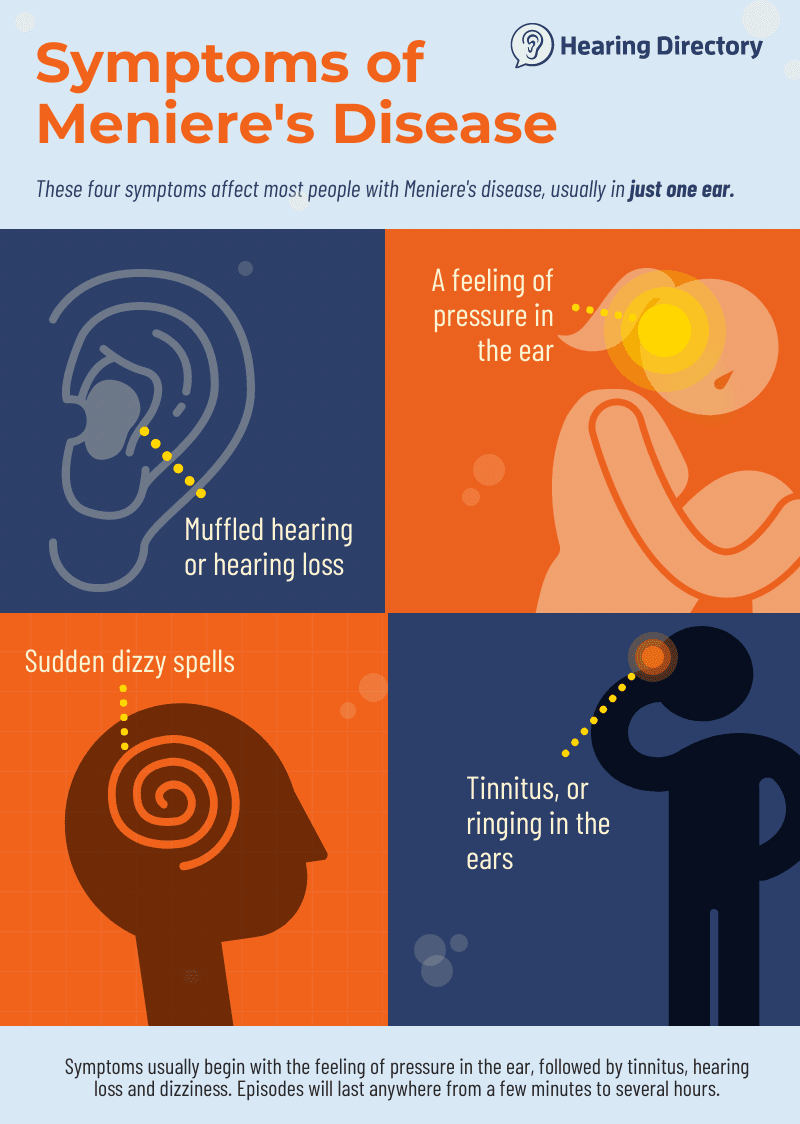Key points:
-
Meniere's disease is a disorder of the inner ear that causes one-sided hearing loss and periods of vertigo and tinnitus.
-
There is no cure for Meniere's, but treatment can reduce the severity and frequency of attacks.
-
Speak to a qualified hearing professional to discuss your treatment options.
Meniere's disease is a disorder of the inner ear that causes periods of vertigo, tinnitus (ringing or roaring in the ears), a feeling of fullness or pressure in the ears, and fluctuating hearing levels on one side. The symptoms can can last minutes, hours or days and can come along without warning or triggers.
About Meniere's disease
It affects women and men equally, and most people develop it in their 40s, 50s or 60s. Overall, the condition is rare: Meniere’s disease impacts an estimated 1 in 1,000 Canadians, or about 0.2% of the population. It gets its name from the French physician Prosper Meniere, who described the condition in 1861.
What causes Meniere's disease?
There is no known cause for Meniere’s disease. The most widely accepted theory is that the episodes or attacks are caused by an abnormal amount of fluid (endolymph) in the inner ear.
Possible causes of endolymph imbalance include:
- Autoimmune reactions
- Allergies
- Viral infection
- Genetics
- Head trauma
- Migraines
- Improper drainage or blockage of fluid path

Symptoms of Meniere's disease
Meniere’s disease can be characterized by the following symptoms:
- Progressive and fluctuating hearing loss in one ear. Patients may experience a change or fluctuation in their affected ear during an episode of Meniere’s disease. Over time the progressive loss becomes permanent. Initially a person may struggle to hear lower-frequency sounds (such as thunder or car engines) that gradually worsens and can affect other frequencies. A person also be more sensitive to certain sounds (hyperacusis) or may find them uncomfortable or irritating (misophonia).
- Tinnitus, which is a sensation of ringing, hissing, buzzing, roaring, or whistling in the ear. The perceived sensation can vary and fluctuate. For some people, it will be mild and for others it may be severe and depending on the severity may impact one’s quality of life.
- Episodes of dizziness (vertigo) and nausea. Vertigo is the sensation that everything is spinning. This sensation can last from 20 minutes up to several hours and can cause nausea and vomiting. The symptoms can start and stop abruptly, with no warning. Often lying down and taking a nap can help with this symptom.
- Fullness/pressure in the ear, known as aural fullness. This symptom may start before or all the others, and it may persist during a flare-up. The pressure feels similar to altitude changes when flying.
- Falls (rarely). Sudden falls, also referred to as "drop attacks" can occur in severe cases. A person may suddenly fall to the ground, and feel they were knocked down.
How is Meniere's disease diagnosed?
An otolaryngologist, also known as an ENT doctor, generally diagnoses Meniere’s disease. There is no single test that is “positive” for Meniere’s disease, so diagnosis is based on a series of tests, including one or more of the following:
Hearing testing: Regular tracking a patient’s hearing levels during and after attacks allows a hearing professional to appropriately treat any hearing loss. Proper amplification, such as hearing aids, can help with the hearing loss as well as potentially mask tinnitus.
Vestibular function and balance testing: These tests assess your inner ear function and how your body reacts to changes in your position. These include:
- Videonystagmography (VNG) – This test evaluates balance function by assessing eye movement. The muscles that control eye movement are linked to the balance sensors in the inner ear.
- Rotary chair testing - this also measures inner ear function based on eye movement.
- Posturography – computerized test that indicates what part of the balance system, vision, inner ear, proprioception (sensation from skin, muscles), you rely on for balance. While in a harness, you stand barefoot on a platform and keep your balance under various conditions.
- Electrocochleography (ECoG) – this test looks at the response of the inner ear to sounds.
Blood tests and MRIs can be used to rule out disorders that cause similar symptoms to Meniere’s disease, such as brain tumors or multiple sclerosis.
The symptoms of Meniere’s disease can change over time. Vertigo may get better (or worse), but generally the tinnitus and pressure remain, and hearing loss gets worse.
How do you treat Meniere's?
There is no cure, so treatments are intended to help reduce the severity and frequency of attacks. Common treatments for management include:
Dietary restrictions: Try to limit your salt intake to less than 2,300mg per day and limit your caffeine to 100mg per day. Other suggestions include avoiding foods that may trigger migraine symptoms, such as MSG, chocolate, red wine, and some dairy and pickled products.
Lifestyle changes: Having a healthy, active lifestyle can help. Try to exercise regularly, quit smoking, reduce alcohol intake and get enough sleep.
Cognitive therapy and stress management: Your tinnitus and vertigo symptoms may improve when you better manage stress.
Vestibular rehabilitation therapy: Some patients find relief from an exercise-based therapy to help retrain their brain and body to balance. This type of treatment is recommended in later stages of Meniere’s disease.
Hearing aids: can be used as a hearing loss treatment and may also assist in masking tinnitus.
Alternative treatments: There are a variety of alternative treatments that have been suggested for Meniere’s—such as acupuncture, herbal supplements, hyperbaric oxygen, and tai chi. To date, there is no concrete evidence that these treatments will help.
Are there medications for Meniere's disease?
Medications focus on treating the various symptoms. These medications may be taken mouth or by injection. For example, motion sickness and anti-nausea medications may reduce spinning sensation and help control nausea. Injections treatments into the middle ear may improve vertigo symptoms. For example:
- Gentamicin – While this drug can increase your risk of hearing loss, it reduces the balance function of your affected ear, and your remaining ear assumes all balance functions.
- Steroids (dexamethasone) – This drug has a similar function to gentamicin, but is less likely to cause hearing loss.
What about surgery?
If other, less invasive vertigo treatments do not work, one of the following types of surgery may be recommended:
- Endolymphatic sac procedure – This involves removal of bone around the endolymph sac, which may alleviate excess fluid levels. A shunt may be placed to drain excess inner ear fluid. This surgery should not affect hearing, but there is a small risk of spinal fluid leak in this procedure.
- Labyrinthectomy – During this surgery, a portion of your inner ear is removed. This is successful for treating the symptoms of vertigo, but results in total loss of hearing on that side.
- Vestibular neurectomy – This involves cutting the vestibular nerve that connects your inner ear to the brain. This usually corrects vertigo problems while preserving hearing on the affected side. There is a risk of spinal fluid leak, infection and stroke.
How to get help
While there is no cure for Meniere’s disease, there are a wide variety of treatment options available to help alleviate the symptoms. If you feel fullness, tinnitus and/or dizziness, it is important to follow up with your health care provider or find a hearing care provider who can help get you started on a treatment plan.
Cara Jelinek, Aud (C), Reg. CASLPO
Contributing author Cara Jelinek graduated with a master’s degree in audiology from the University of Western Ontario in 2003. She has over 15 years of clinical experience assessing and treating both adult and pediatric populations as well as actively participating in and leading community outreach, teaching and clinical management. Cara finds the variety and pace fulfilling and enjoys working with the public. She is also an active volunteer and coach in her local community.
 Are you located in the United States?
Are you located in the United States?


